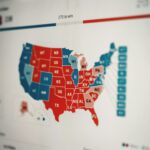Weekly Writers Round-Up: Appalachian Politics, Senate Tech Struggles, and College Planning Problems
Each week, we’ll be featuring opinion pieces from the alumni and current participants of AFF’s Writing Fellows Program. A few highlights from the past week are below. Do you dream of having bylines like these? Learn more about how the Writing Fellows Program can help boost your writing career!
Appalachia Went Republican Because Democrats Left It Behind by Anthony Hennen (Spring 2019) in expatalachians
Since George W. Bush in 2000, Appalachia has voted more and more for the Republican Party. Before then, however, the region was politically competitive. Democrats like Franklin D. Roosevelt and John F. Kennedy solidified power for themselves and local Democrats. Families passed their Democratic identity down through the generations.
The recent Republican turn is reflective of political changes in the region and across America. In one sense, Appalachia has not become more Republican so much as Democrats have left the region behind. Economic changes have made Republican candidates more appealing to the average voter in Appalachia, and the Democratic Party’s national campaign strategy relies less and less on the region’s voters…
Google Senate hearing proves politicians do not understand how tech markets work by James Czerniawski (Summer 2020) in the Washington Times
If there’s one thing last week’s hearing of the Senate subcommittee on Antitrust, Competition Policy, and Consumer Rights revealed about policymakers, it’s that they haven’t got a clue how markets work.
The purpose of the hearing, overseen by Sen. Mike Lee, was to gain a better understanding of online advertising and to determine whether or not Google has indeed been anticompetitive in this sector of the economy. Of course, politicians from both sides of the aisle strayed from the set topic to grandstand. At one point, Sen. Richard Blumenthal, Connecticut Democrat, even tried to lay the “death of local journalism” on tech companies…
Why Central Planning In Higher Education Doesn’t Work by Preston Cooper (Fall 2015) in Forbes
In an excellent policy brief for the Niskanen Center, Robert Orr explains that the high cost of health care in the United States is a function of the relatively low number of new doctors that our higher-education system produces every year. The shortage of physicians is no accident. Instead, it is the result of deliberate pressure by the federal government and other bodies to reduce the supply of medical school graduates in response to a perceived “physician surplus.”
The episode and its disastrous consequences are a reminder of how using the heavy hand of government to steer various sectors of the economy usually creates more problems than it solves. This is especially true in higher education, where political interventions with the aim of achieving specific economic outcomes continue…




